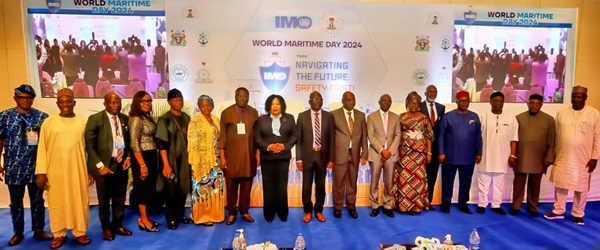
The Minister of Marine and Blue Economy, Adegboyega Oyetola, has reaffirmed Nigeria’s commitment to promoting global maritime safety standards, in line with the International Maritime Organisation (IMO) campaign for sustainable development in the maritime industry.
Oyetola emphasised Nigeria’s dedication to enhancing safety for seafarers, infrastructure and the environment.
The minister made these remarks during his keynote address at the 2024 World Maritime Day celebration held in Lagos on September 26, 2024. The theme of the event was “Navigating the Future: Safety First.”
Oyetola, who was represented by the permanent secretary of the ministry, Olufemi Oloruntola highlighted the relevance of this year’s theme, noting that safety is a fundamental prerequisite for building a business-friendly maritime sector. He pointed out that the event provides an opportunity to reflect on Nigeria’s progress in maritime development and its potential to drive national economic growth.
The minister also underscored that 2024 marks the 50th anniversary of the 1974 adoption of the International Convention for the Safety of Life at Sea (SOLAS), the world’s most important treaty for merchant ship safety. He reiterated Nigeria’s commitment to aligning its regulatory framework with IMO standards and global regulations. According to Oyetola, the administration of President Bola Tinubu is making significant investments in port modernisation through public-private partnerships. These investments aim to reduce inefficiencies, lower operational costs and improve safety within the sector.
Oyetola also called for continued collaboration with the private sector to achieve world-class standards in Nigeria’s maritime industry. He emphasised the importance of state-of-the-art facilities in elevating the sector to a higher level.
The special guest of honour, Prof. Larry Awosika reflected on the current state of Nigeria’s maritime industry and the way forward for a safer, more sustainable future. He noted that Nigeria’s maritime sector has long been a cornerstone of the country’s economy, driving a significant portion of international trade. However, despite its immense potential, the industry faces several challenges that threaten to undermine its full capacity.
Awosika pointed out that maritime security remains a pressing issue, with piracy, armed robbery and other illicit activities persisting in the Gulf of Guinea. These threats not only disrupt trade but also endanger lives and increase insurance costs, making Nigeria’s shipping routes less attractive to international operators.
To strengthen maritime security, Awosika called on the Federal Government to deepen regional and international cooperation. He also emphasised the need to implement the Deep Blue Sea Project, enhance surveillance, improve training for maritime security personnel and invest in cutting-edge technology such as drones and satellite monitoring systems.
In his welcome address, the permanent secretary described the World Maritime Day celebration as more than a commemoration. He highlighted that the event reaffirms the vital role the maritime sector plays in sustaining global trade, fostering economic growth and driving sustainable development.
Oloruntola, who was represented by the director of Maritime Safety and Security, Babatunde Bombata stressed that the theme of the event serves as a reminder to place safety at the forefront of every decision within the maritime domain. He warned that without priohumasing safety, human lives, ecosystems and economies reliant on oceans are at risk.
He also noted that rapid technological advancements, such as autonomous vessels, renewable energy platforms and artificial intelligence, present both opportunities and new risks. Oloruntola emphasised the importance of ensuring that these innovations enhance safety standards, guiding the maritime sector into a future where technology and safety work hand in hand.

